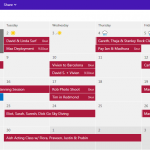About those Windows 8 ads...

There’s more than one way to advertise a product and while I am a big fan of the approach that specifically focuses on features, I understand there is a need for other approaches. Sometimes you just need to go for the pure emotional response. In the case of the ads released by Microsoft today which focus on the Asian market that seems to be what they were going for. Take a look.
Unroll.Me rids your inbox of unwanted subscriptions

I'll admit, I'm a sucker for subscriptions. I subscribe to receive periodic emails with the latest discounts for tech gear, car news or any other bits of useful information (well, at least to me). Maybe there's something nice out there that I want to know about. But because the emails keep coming in at different times of the day, going through each and every one would be a waste of time.
Cloud service Unroll.Me promises to solve the problem of subscription overload by allowing its users to wrap those emails into one big daily digest. Although the unsubscribe option is also available, the idea is to give folks the ability to actually make the best of the stuff that keeps coming in without, likely, losing track of vacation deals or the latest social updates.
Sorry Microsoft, I’m switching back to Google (but not entirely)

Fifth in a series. Nearly two months ago I gave up Google and switched to Microsoft. Although I tried not to have any preconceptions, I’ll be honest and say I thought (based on past experience), I’d be swapping a set of mostly superb products and services for a collection of inferior alternatives and hate every moment I was away from Google.
That turned out not to be the case. Now my experiment is over, I find myself impressed with some elements of Microsoft’s offerings, but frustrated with others. So here’s a summary of my overall experience.
Skype video messaging for Windows 8 out now

On April 30th, while announcing Skype video messaging for the desktop, Microsoft let it be known that the feature would be coming to the Windows 8 app soon, as well. The company did not lie -- soon arrives today. The communication app already had video calling, but Skype Video Messaging lets you record and send a video message, as opposed to making a live call. This enables getting your message across, even when the recipient is away from his or her PC or phone -- think SMS with video capability.
The new version of the Skype "Metro" app is officially 1.7 and available now from the Windows Store, although the feature is still considered a "preview".
Microsoft busts some myths with new Outlook ad

Microsoft is in the process of pushing users to Outlook.com for web email services. The company purchased Hotmail back in 1997, largely ignored it, and then suddenly began updating the app right before deciding to unceremoniously replace it with Outlook.com back in July of 2012.
Now the company is in full push-mode to get users moved over and also try to woo new customers for the service. With that in mind, Microsoft has teamed up with the folks from the popular Mythbusters TV show to advertise Outlook.com and also push the brand new season of the show.
Microsoft is concerned about your privacy -- and wants you to be too

Your privacy is Microsoft’s priority. At least that’s what the software giant is saying. According to Ryan Gavin, General Manager, Windows, the company takes its responsibilities for protecting your privacy very seriously.
To prove this, Microsoft is launching a new consumer awareness campaign focused on online privacy. There’s a special information and tools page at www.Microsoft.com/YourPrivacy (which is so private it doesn’t currently exist), and an ad campaign to "kick start awareness and conversation".
Set up two-step authentication for your Microsoft account on Windows Phone

Following the lead of a number of high-profile companies like Apple, Dropbox and Google, Microsoft has finally embraced two-step authentication. Two days ago, the company unveiled the feature which, in order to "help keep your account more secure", enables using security codes or application-specific passwords when accessing Microsoft services. Sadly, for Android and iOS users, Microsoft only offers a Windows Phone app, at this point, to generate security codes.
The app is called Authenticator and works with both Windows Phone 8 as well as Windows Phone 7.5 (ironically, it was the app that revealed Microsoft's plans to offer the security feature in the first place). This guide will show you how to enable two-step authentication for your Microsoft account and use Authenticator to generate security codes on your Windows Phone smartphone.
Microsoft Research adds new functionality to Outlook

Most of the focus these days seems to be around Outlook.com, as Microsoft anxiously endeavours to move its apps online and turn software into a service. But, while the latest version of Microsoft's productivity suite -- Office 365 Home Premium -- includes the ability to access the apps on the web, ultimately it is still a software suite on your computer.
Now Microsoft Research wants to bring new functionality to the desktop version of Outlook and is announcing the release of Mañana Mail to do just that.
Authenticator for Windows Phone hints two-factor verification will come to Microsoft accounts

Microsoft has released an app for Windows Phone called Authenticator, which is designed to generate security codes associated with two-factor authentication. Nothing special so far, other than Microsoft's name being associated with the app. What is noteworthy is that, according to the release notes, you can use Authenticator "to help keep your Microsoft account secure". Is Microsoft finally taking the user's security seriously?
At the time of writing this article two-factor authentication is not avilable for my Outlook.com account. But this suggests that, eventually, Microsoft will enable the extra security measure for its cloud services, presumably sometime soon and likely for Outlook.com first of all. Currently users have to rely on the complexity of their passwords in order to insure the safety of their Microsoft accounts, whereas Google users, for example, have had the option to use two-factor authentication for quite some time.
SkyDrive app is Microsoft's 'new normal'

Microsoft continues to match development pace with Google, releasing today yet another app update. SkyDrive 3.0 for iOS follows many other recent releases, including Outlook.com Calendar (this week), Windows 8/RT Mail, Calendar and People apps (last week) and SkyDrive (mid-March), among others.
In my news analysis about the new Windows 8/RT core apps, I asserted: "It's a new Microsoft", explaining how the company has greatly picked up the pace of new product development -- something also seen in Windows Blue, which I expect to ship less than a year after the great 8. A day following my analysis, Frank Shaw, Microsoft corporate communications chief, said that "continuous development cycle is the new normal across Microsoft", which is consistent with reinvention as the "devices and services" company that CEO Steve Ballmer described last year.
It's about time! Microsoft's consumer cloud calendar gets a new Outlook

Windows Live Calendar (there's supposed to officially be "Hotmail" in there) is dead -- or soon will be. Today, Microsoft started rolling out the replacement for Outlook.com users. I've got the old one still, which is why the not-quite-lifeless-yet reference.
There's some kind of aspirational, Apple-like promotion going on here. "The Outlook.com calendar has been entirely redesigned with a modern, intuitive interface that puts you in control of your schedule", David Dennis, Microsoft's Outlook.com Calendar principal program manager lead, beams. Yeah, baby, put me in control. Gimme the mouse clicker.
Microsoft details how much of your data the Feds want

Last month Google released a transparency report revealing how often law enforcement inquires about users' private data. Hint: it's more often than you want to believe. Not to be outdone, today Microsoft posts its own data, which the company refers to as the "2012 Law Enforcement Requests Report".
While the number of requests may seem staggering, there is some perspective to be had in all of this. First the raw data reported -- "Microsoft and Skype received a total of 75,378 law enforcement requests. Those requests potentially impacted 137,424 accounts". Sounds rather high doesn't it?
Switching from Google to Microsoft, part 2 -- Teething problems

Second in a series. You know when you go somewhere on holiday and in a moment of fancy you think to yourself "I could live here"? But a small part of you knows deep down inside that the reality would be very different from the fantasy? That’s a bit like what my first experience of swapping from Google to Microsoft has been like so far.
I’ve used Internet Explorer on and off over the years, but I’ve never used it for very long. The last time it was my main browser was in 2003, ten years ago. Similarly I’ve used Outlook.com since it launched, but not as my main email provider. So in setting them up to use on a daily continual basis I’ve found it all quite odd. I’m adrift in a place where they do things differently. Not worse -- well not really -- just differently.
Skype for Windows Phone 8 now features People Hub integration

Microsoft is rolling out an updated Skype app for Windows Phone 8 devices featuring integration with the People Hub. The latest move comes nearly two weeks after the software giant teased a similar feature for Outlook.com, which touts Skype integration as "coming soon".
Skype integration with the People Hub is available for devices running Windows Phone 8 version 8.0.10211.204 and newer and is automatically enabled after installing or updating the app. The new Skype app also brings support for HD video calls, video calls in landscape or portrait mode, and additionally allows users to use both cameras.
Sorry Google, I’m switching to Microsoft

A week ago, I had a dream. I was sitting on a beach with a glass of wine and a laptop and I was searching the internet using Bing. My wife came up, saw what I was doing, and said "Why aren’t you using Google?" To which I replied, "I’m boycotting it. The company shutdown Reader." Yes, that’s right, I dreamt Reader was being shuttered before Google even announced it, and now I’m using Bing. Spooky or what?
But let’s make one thing very clear here. Although I plan to switch to using Microsoft’s services for a while, it’s not a boycott. I realized, after the dream, that I’ve been so tied into Google that I’ve never really given Microsoft’s alternatives -- Bing, Outlook.com, Bing Maps, and even Internet Explorer -- a fair chance to see how they compare. I've used them, in passing at least, but I've never used them full time. And today that’s about to change.
Recent Headlines
Most Commented Stories
© 1998-2025 BetaNews, Inc. All Rights Reserved. About Us - Privacy Policy - Cookie Policy - Sitemap.